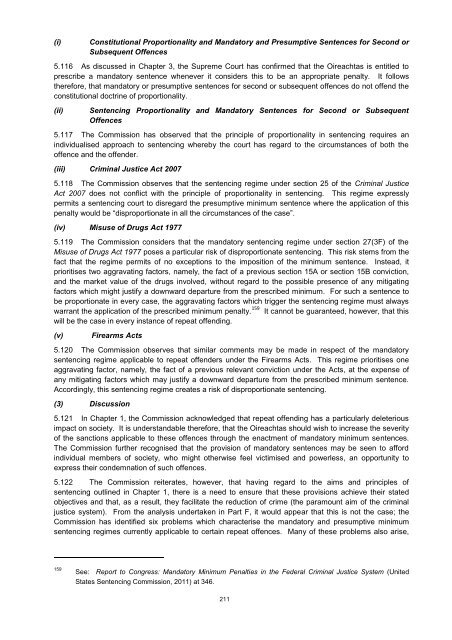Report on Mandatory Sentences - Law Reform Commission
Report on Mandatory Sentences - Law Reform Commission
Report on Mandatory Sentences - Law Reform Commission
You also want an ePaper? Increase the reach of your titles
YUMPU automatically turns print PDFs into web optimized ePapers that Google loves.
(i)<br />
C<strong>on</strong>stituti<strong>on</strong>al Proporti<strong>on</strong>ality and <strong>Mandatory</strong> and Presumptive <strong>Sentences</strong> for Sec<strong>on</strong>d or<br />
Subsequent Offences<br />
5.116 As discussed in Chapter 3, the Supreme Court has c<strong>on</strong>firmed that the Oireachtas is entitled to<br />
prescribe a mandatory sentence whenever it c<strong>on</strong>siders this to be an appropriate penalty. It follows<br />
therefore, that mandatory or presumptive sentences for sec<strong>on</strong>d or subsequent offences do not offend the<br />
c<strong>on</strong>stituti<strong>on</strong>al doctrine of proporti<strong>on</strong>ality.<br />
(ii)<br />
Sentencing Proporti<strong>on</strong>ality and <strong>Mandatory</strong> <strong>Sentences</strong> for Sec<strong>on</strong>d or Subsequent<br />
Offences<br />
5.117 The Commissi<strong>on</strong> has observed that the principle of proporti<strong>on</strong>ality in sentencing requires an<br />
individualised approach to sentencing whereby the court has regard to the circumstances of both the<br />
offence and the offender.<br />
(iii) Criminal Justice Act 2007<br />
5.118 The Commissi<strong>on</strong> observes that the sentencing regime under secti<strong>on</strong> 25 of the Criminal Justice<br />
Act 2007 does not c<strong>on</strong>flict with the principle of proporti<strong>on</strong>ality in sentencing. This regime expressly<br />
permits a sentencing court to disregard the presumptive minimum sentence where the applicati<strong>on</strong> of this<br />
penalty would be “disproporti<strong>on</strong>ate in all the circumstances of the case”.<br />
(iv) Misuse of Drugs Act 1977<br />
5.119 The Commissi<strong>on</strong> c<strong>on</strong>siders that the mandatory sentencing regime under secti<strong>on</strong> 27(3F) of the<br />
Misuse of Drugs Act 1977 poses a particular risk of disproporti<strong>on</strong>ate sentencing. This risk stems from the<br />
fact that the regime permits of no excepti<strong>on</strong>s to the impositi<strong>on</strong> of the minimum sentence. Instead, it<br />
prioritises two aggravating factors, namely, the fact of a previous secti<strong>on</strong> 15A or secti<strong>on</strong> 15B c<strong>on</strong>victi<strong>on</strong>,<br />
and the market value of the drugs involved, without regard to the possible presence of any mitigating<br />
factors which might justify a downward departure from the prescribed minimum. For such a sentence to<br />
be proporti<strong>on</strong>ate in every case, the aggravating factors which trigger the sentencing regime must always<br />
warrant the applicati<strong>on</strong> of the prescribed minimum penalty. 159 It cannot be guaranteed, however, that this<br />
will be the case in every instance of repeat offending.<br />
(v)<br />
Firearms Acts<br />
5.120 The Commissi<strong>on</strong> observes that similar comments may be made in respect of the mandatory<br />
sentencing regime applicable to repeat offenders under the Firearms Acts. This regime prioritises <strong>on</strong>e<br />
aggravating factor, namely, the fact of a previous relevant c<strong>on</strong>victi<strong>on</strong> under the Acts, at the expense of<br />
any mitigating factors which may justify a downward departure from the prescribed minimum sentence.<br />
Accordingly, this sentencing regime creates a risk of disproporti<strong>on</strong>ate sentencing.<br />
(3) Discussi<strong>on</strong><br />
5.121 In Chapter 1, the Commissi<strong>on</strong> acknowledged that repeat offending has a particularly deleterious<br />
impact <strong>on</strong> society. It is understandable therefore, that the Oireachtas should wish to increase the severity<br />
of the sancti<strong>on</strong>s applicable to these offences through the enactment of mandatory minimum sentences.<br />
The Commissi<strong>on</strong> further recognised that the provisi<strong>on</strong> of mandatory sentences may be seen to afford<br />
individual members of society, who might otherwise feel victimised and powerless, an opportunity to<br />
express their c<strong>on</strong>demnati<strong>on</strong> of such offences.<br />
5.122 The Commissi<strong>on</strong> reiterates, however, that having regard to the aims and principles of<br />
sentencing outlined in Chapter 1, there is a need to ensure that these provisi<strong>on</strong>s achieve their stated<br />
objectives and that, as a result, they facilitate the reducti<strong>on</strong> of crime (the paramount aim of the criminal<br />
justice system). From the analysis undertaken in Part F, it would appear that this is not the case; the<br />
Commissi<strong>on</strong> has identified six problems which characterise the mandatory and presumptive minimum<br />
sentencing regimes currently applicable to certain repeat offences. Many of these problems also arise,<br />
159<br />
See: <str<strong>on</strong>g>Report</str<strong>on</strong>g> to C<strong>on</strong>gress: <strong>Mandatory</strong> Minimum Penalties in the Federal Criminal Justice System (United<br />
States Sentencing Commissi<strong>on</strong>, 2011) at 346.<br />
211
















